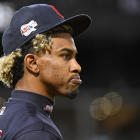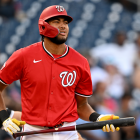Why small-market excuses for not spending, from teams like the Indians and Brewers, don't hold up
Both Cleveland and Milwaukee seem intent on saving money this winter
For a number of teams, the Competitive Balance Tax (CBT) on payrolls provides all the rationale they need to tamp down on spending. Witness, for instance, the well heeled likes of the Cubs using the language of capability as opposed to choice when it comes to spending (they "can't" afford the likes of Eric Sogard, to cite one bit of recent comedy). As observers of the game, we'd do well not to frame, say, the Cubs, Red Sox, Dodgers, and their overflowing revenues as passive actors when it comes to their willingness to invest in the product. Those teams certainly can afford to improve the playoff-grade rosters in place, but they choose not to because they can get away with it.
Back in the late 1990s and early aughts, team owners and their philosopher-king Bud Selig had persistent waking dreams of a salary cap in MLB. They pursued it under the guise of competitive balance, but in reality it had everything to do with tamping down labor costs and minimizing the already minimal risk involved in owning a team. All of that led up to the clumsy bit of agitprop that was the Commissioner's Blue Ribbon Panel on Baseball Economics and the report it conjured up. They never got that hard cap, but they did eventually get the aforementioned CBT, which has come to function quite a bit like a cap of solid-average rigidity.
That explains much of what's going on with the Cubs, Red Sox, and Dodgers. Teams these days have so many guaranteed paths to profitability that engaging the fan base via a vigorous and dedicated offseason isn't necessary, and when they need cover for not doing so they can point to the CBT. For others who aren't CBT payors -- the Brewers and Indians, namely -- they need to trot out other justifications. In those specific instances, the cover they're providing seems plucked from those quainter times invoked above.
In the instance of the Brewers, it hasn't been a shameful winter, to be fair. They've added Sogard -- so elusive to the division rival Cubs -- and traded for Omar Narvaez. Luis Urias gives them a new look at shortstop, and Justin Smoak will be the new first baseman (albeit one who'll probably bat near the bottom of the order). Avisail Garcia adds an interesting bat to the outfield mix, and Brett Anderson, Josh Lindblom, and Eric Lauer are new to the chronically neglected Milwaukee rotation.
That said, they've also suffered losses. Yasmani Grandal, who's in the discussion for best all-around catcher in baseball, inked with the White Sox, as did lefty Gio Gonzalez and his 17 mostly good starts. Mike Moustakas and Eric Thames, who combined for 60 home runs in 2019, are gone. Also gone are Zach Davies and Chase Anderson and the almost 300 innings of solidly above-average pitching they provided. Trade rumors have swirled about elite relief ace Josh Hader, who's eligible for arbitration as a super two this winter.
This all adds up to, at best, shuffling and wheel-spinning for a team that had a middling plus-three run differential and barely sneaked into the playoffs as the second NL wild-card team. This is a roster in need of improvements, not idle shuffling. In the full light of recent ownership behavior across the league, half-measures should never be surprising. The Brewers' excuse, though, is a bit of a throwback to when every club was exposing their pocket linings and pleading destitution. A recent piece in the Milwaukee Journal Sentinel stated the Brewers lost money last season.
MLB clubs are privately held, which means they're under no obligation to disclose their financials. The hope on their part is that you'll take them at their word, even when they make "specious at best" comments.
Per Forbes estimates, the Brewers in 2018 cleared a hefty $66 million in operating income, which places them in the top third of the league. Yes, Milwaukee's payroll went up in 2019, but so did its attendance (to 2.92 million). Yes, the Brewers invested in upgrades to their spring training facilities, but those were almost certainly debt financed. Even if the Brewers put the entire expense of that investment on their books for 2019, it almost certainly didn't eat up all their profits. When teams do need to claim paper losses for whatever reason, they can do things like that. Or as former Blue Jays president and MLB president Paul Beeston once said:
"Anyone who quotes profits of a baseball club is missing the point. Under generally accepted accounting principles, I can turn a $4 million profit into a $2 million loss, and I can get every national accounting firm to agree with me."
To repeat, MLB teams aren't obligated to disclose their financials, and when they do voluntarily hint at them they do so for specific purposes. Also, on those rare occasions that team financials have seen the light of day, even the putative underclass of MLB has been revealed to be highly profitable. If the Brewers want to assert that they lost money last year, then they need to open their books to the extent that a forensic accounting of what's in them is possible. Feel free to tend to other business while you wait for that to happen.
In the case of the Indians, they've operated even more cynically than the Brewers have. Ownership's unwillingness to invest in the team last offseason cost them a playoff berth. This offseason, they've traded away Corey Kluber, and it's highly possible that franchise shortstop Francisco Lindor will be elsewhere by Opening Day.
The Indians play in an eminently winnable division, and given the likelihood that the Twins will regress in 2020, Cleveland can plausibly be considered the favorites in the AL Central. Trade away Lindor, though, and that will no longer be the case. So why fritter away a 26-year-old who for his career has averaged 29 home runs and 40 doubles per 162 games played in addition to flashing speed on the bases and a slick glove at a highly premium position? You see, the Indians -- bless their hearts -- can't afford to keep him:
Really shameful that #Indians develop a star like Lindor and have no shot of signing him to long-term deal. Baseball is beyond broken.
— Tom Withers (@twithersAP) December 21, 2019
This, like the Brewers reportedly losing money, isn't coming straight from the team, but it's what's been communicated -- tacitly or otherwise -- to justify the Lindor rumors and prep the fan base for that eventuality. It's also a preposterous notion.
Yes, the Indians can afford to keep Lindor. According to those Forbes estimates, the Indians rank 17th in MLB in total revenues, or just outside the top half. They're just behind the Brewers. They're just ahead of the Padres. The "market score" metric that MLB uses to determine revenue sharing places the Indians just ahead of the Padres. The Padres are notable in this instance because over the last three offseasons they've guaranteed more than half a billion dollars to Wil Myers, Eric Hosmer, and Manny Machado. If the similarly positioned Padres can do all that, then, yes, the Indians can afford to keep Lindor no matter what the club or its valets say about the matter.
This is especially the case since Lindor still has two years of team control remaining before he hits free agency. While players get big salary boosts in arbitration, they're still underpaid during their arb years. Yes, the Indians can pay those rates and keep their best player in a plausible two-year bid to win the World Series for the first time since 1948. They can also afford any realistic contract extension that digs into Lindor's free-agent years. This is entirely a matter of will on the part of the organization. They ranked 19th in payroll last season, and right now they're 24th in payroll for 2020 (with Lindor part of the calculus). The Indians are not stretched or even particularly close to it. If they don't want to keep Lindor, then fair enough. But don't allow the Indians to blame structural conditions for a Lindor trade when the true culprit is Dolan family avarice.
All of this circles back to the prevailing notion that teams are simply not to be trusted when it comes to what they say or imply about their finances. They don't have to, and there are no incentives to do so of their own volition. That's the case whether we're talking about a colossus like the Cubs, Dodgers, or Red Sox or a more modestly endowed squad like the Brewers or Indians. As fans and writers, we need to hold them to account for this dishonesty. To different extents, the Brewers and Indians are choosing to do less than they should be doing. And, yes, it's entirely a matter of choice. Don't let them tell you otherwise.


















